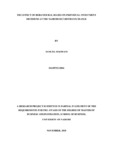| dc.description.abstract | The general objective of the study was to establish the effect of behavioral biases on the
individual investment decisions of individual investors who trade at the Nairobi Securities
Exchange. Descriptive statistics and inferential statistics were used to analyze the data with
the aid of SPSS. The researcher administered 385 semi-structured questionnaires to
individual investors who traded at the Nairobi Securities Exchange and received 308 properly
filled questionnaires giving response rate of 80% and a none response of 20%. The study
concluded that there was a strong relationship (R-value = 0.729) between behavioral biases
(herding bias, overconfidence bias, representativeness bias and mental accounting bias) and
individual investment decisions of individual investors who trade at the Nairobi Securities
Exchange. The Adjusted R Square value of 0.525 revealed that behavioral biases can explain
52.5% of the total variance in the individual investment decisions of individual investors who
trade at the NSE. The study also concluded that herding bias and overconfidence bias have a
negative and statistically significant effect on individual investment decision making while
representative bias and mental accounting bias had a positive and statistically significant
effect on individual investment decision making. This implied that increasing herding bias
and overconfidence bias would reduce the quality of individual investment decision making
while representative bias and mental accounting bias would improve the quality of individual
investment decision making in a statistically significant manner. The study recommends that
individual investors who trade at the Nairobi Securities Exchange should take time to analyze
stock movements rationally since herding bias and overconfidence bias have a negative and
statistically significant effect on their investment decision they make hence resulting to more
losses. Some of the respondents were reluctant had fear of the information being used for
other reasons hence hesitant to fill the questionnaires. However, the researcher assured the
respondents that the information they provide would be treated with utmost confidentiality
and would only be used to fulfill academic requirements. The respondents being investors
trading at the Nairobi Securities Exchange had busy working schedules which made the data
collection process tedious and slow. The researcher used drop-and-pick-later method to give
the respondents ample time to fill the questionnaires. The scope of “this study was limited to
the effects of behavioural biases on individual investment decisions at the Nairobi Securities
Exchange. This implies that the findings cannot be adequately applied to non-behavioural
factors that influence the individual investment decisions making of individual investors who
trade at the Nairobi Securities Exchange. In future, a similar study should be done focusing
on non-behavioural factors and effects of behavioural biases on other areas of investment
other than securities. | en_US |

